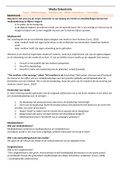Thesis
A* EPQ Essay: In what ways was the English language affected by the Norman Conquest of 1066?
- Module
- EPQ A* Essay
- Institution
- PEARSON (PEARSON)
This is a full EPQ example essay, which received an A* (June 2023). The document also includes a table of contents, which gives an idea of how to structure the thesis. The topic is on the linguistic impacts on the Norman Conquest, and chapters include 'expanding the lexicon', 'exploring outside the...
[Show more]






